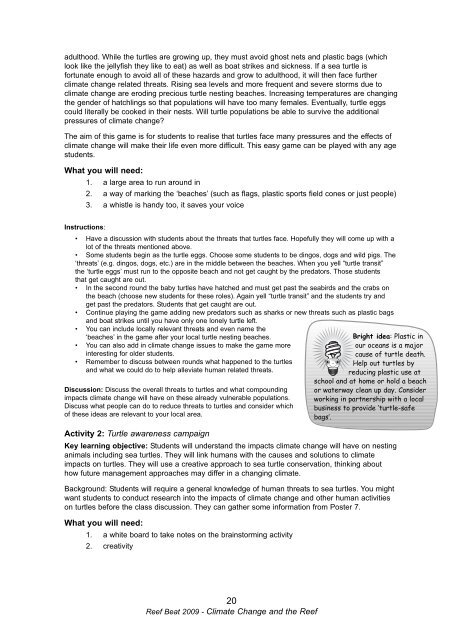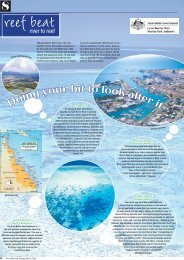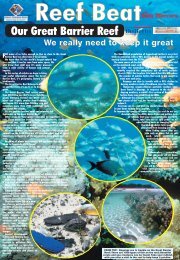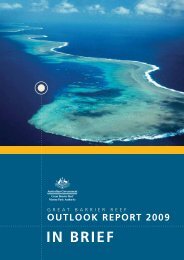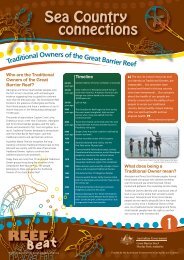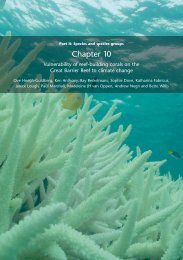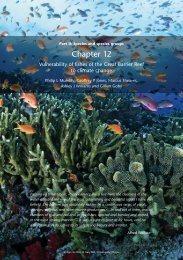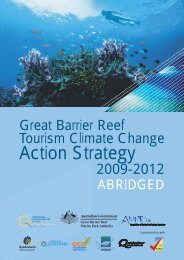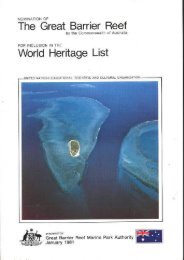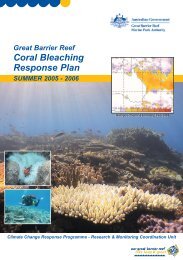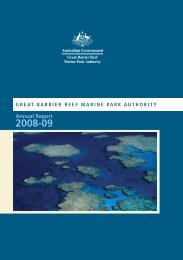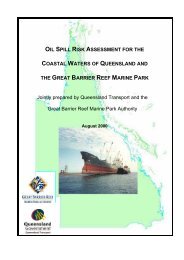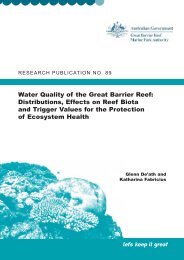ACTIVITIES BOOK - Great Barrier Reef Marine Park Authority
ACTIVITIES BOOK - Great Barrier Reef Marine Park Authority
ACTIVITIES BOOK - Great Barrier Reef Marine Park Authority
Create successful ePaper yourself
Turn your PDF publications into a flip-book with our unique Google optimized e-Paper software.
adulthood. While the turtles are growing up, they must avoid ghost nets and plastic bags (whichlook like the jellyfish they like to eat) as well as boat strikes and sickness. If a sea turtle isfortunate enough to avoid all of these hazards and grow to adulthood, it will then face furtherclimate change related threats. Rising sea levels and more frequent and severe storms due toclimate change are eroding precious turtle nesting beaches. Increasing temperatures are changingthe gender of hatchlings so that populations will have too many females. Eventually, turtle eggscould literally be cooked in their nests. Will turtle populations be able to survive the additionalpressures of climate change?The aim of this game is for students to realise that turtles face many pressures and the effects ofclimate change will make their life even more difficult. This easy game can be played with any agestudents.What you will need:1. a large area to run around in2. a way of marking the ‘beaches’ (such as flags, plastic sports field cones or just people)3. a whistle is handy too, it saves your voiceInstructions:• Have a discussion with students about the threats that turtles face. Hopefully they will come up with alot of the threats mentioned above.• Some students begin as the turtle eggs. Choose some students to be dingos, dogs and wild pigs. The‘threats’ (e.g. dingos, dogs, etc.) are in the middle between the beaches. When you yell “turtle transit”the ‘turtle eggs’ must run to the opposite beach and not get caught by the predators. Those studentsthat get caught are out.• In the second round the baby turtles have hatched and must get past the seabirds and the crabs onthe beach (choose new students for these roles). Again yell “turtle transit” and the students try andget past the predators. Students that get caught are out.• Continue playing the game adding new predators such as sharks or new threats such as plastic bagsand boat strikes until you have only one lonely turtle left.• You can include locally relevant threats and even name the‘beaches’ in the game after your local turtle nesting beaches.• You can also add in climate change issues to make the game moreinteresting for older students.• Remember to discuss between rounds what happened to the turtlesand what we could do to help alleviate human related threats.Discussion: Discuss the overall threats to turtles and what compoundingimpacts climate change will have on these already vulnerable populations.Discuss what people can do to reduce threats to turtles and consider whichof these ideas are relevant to your local area.Activity 2: Turtle awareness campaignKey learning objective: Students will understand the impacts climate change will have on nestinganimals including sea turtles. They will link humans with the causes and solutions to climateimpacts on turtles. They will use a creative approach to sea turtle conservation, thinking abouthow future management approaches may differ in a changing climate.Background: Students will require a general knowledge of human threats to sea turtles. You mightwant students to conduct research into the impacts of climate change and other human activitieson turtles before the class discussion. They can gather some information from Poster 7.What you will need:1. a white board to take notes on the brainstorming activity2. creativityBright idea: Plastic inour oceans is a majorcause of turtle death.Help out turtles byreducing plastic use atschool and at home or hold a beachor waterway clean up day. Considerworking in partnership with a localbusiness to provide ‘turtle-safebags’.20<strong>Reef</strong> Beat 2009 - Climate Change and the <strong>Reef</strong>


